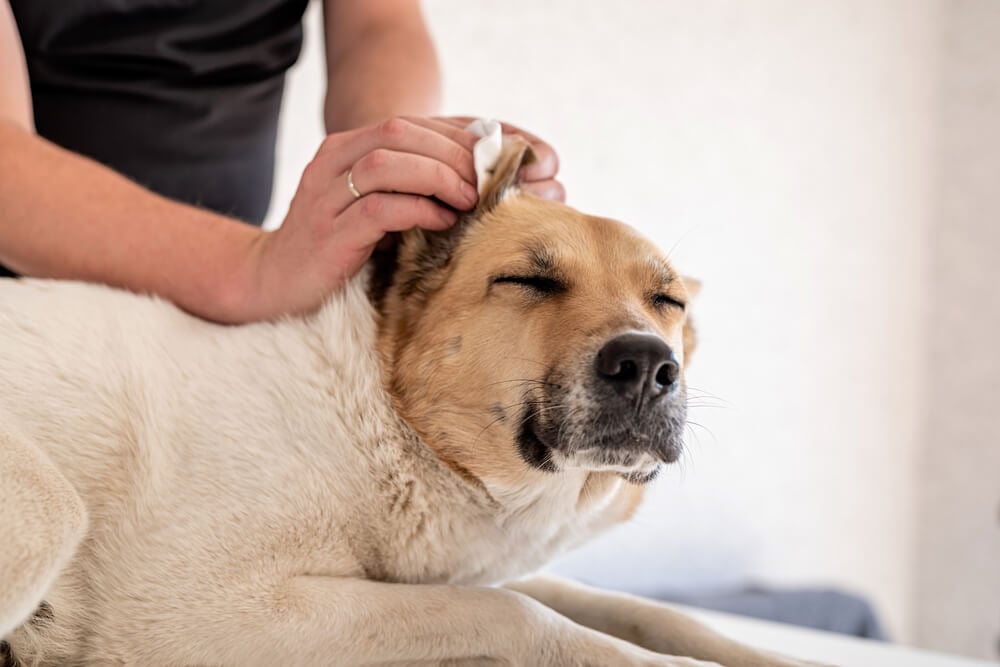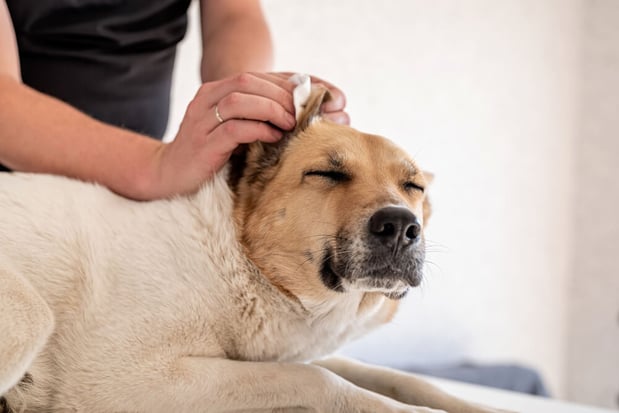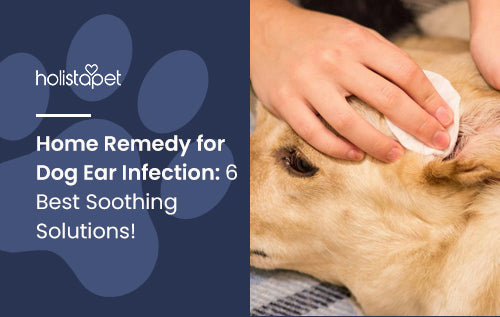Dog ear infections can be a common yet troublesome issue for pet owners. Recognizing symptoms early and providing immediate care at home helps prevent complications. Regularly cleaning your dog’s ears reduces the risk of infections. Use a gentle, vet-approved ear cleaner for this task.
Applying prescribed ear drops or medications ensures effective treatment. Always consult your veterinarian before starting any home treatment. Keeping your dog’s ears dry and free of debris is crucial. By maintaining proper ear hygiene, you can help your dog stay healthy and comfortable. Remember, early intervention is key to managing ear infections effectively.
Identifying Symptoms
Understanding the symptoms of dog ear infections is crucial. Knowing the signs early can help you treat your dog’s ear infections at home. Below, we cover the most common signs and when you should seek vet help.
Common Signs
- Scratching: Your dog may scratch its ears a lot.
- Head Shaking: Frequent head shaking can be a sign.
- Odor: A foul smell from the ears is common.
- Discharge: Look for yellow, brown, or bloody discharge.
- Redness: Red and swollen ears can indicate an infection.
- Crusts or Scabs: Crusts or scabs on the ear flap.
When To Seek Vet Help
If your dog shows severe symptoms, visit the vet immediately. Here are situations when you need to seek professional help:
- Severe Pain: Your dog yelps when touching the ear.
- Persistent Symptoms: Symptoms last more than a week.
- Loss of Balance: Your dog has trouble walking.
- High Fever: Your dog has a high temperature.
- Hearing Loss: Noticeable hearing loss in your dog.
| Symptom | Severity |
|---|---|
| Scratching | Mild |
| Head Shaking | Moderate |
| Odor | Moderate |
| Discharge | Moderate to Severe |
| Redness | Mild to Severe |
| Crusts or Scabs | Mild to Moderate |
By recognizing these symptoms, you can address your dog’s ear infections early. This ensures a happier and healthier pet.

Credit: www.amazon.com
Cleaning The Ears
Cleaning your dog’s ears is a crucial step in treating ear infections at home. Proper cleaning removes debris, wax, and bacteria, aiding the healing process. Follow this guide to ensure your dog’s ears are cleaned effectively and safely.
Supplies Needed
- Ear cleaning solution (vet-recommended)
- Cotton balls or gauze pads
- Treats for positive reinforcement
- Soft towel for drying
- Gloves to keep your hands clean
Step-by-step Guide
- Prepare the cleaning area: Find a quiet place where your dog feels comfortable.
- Wear gloves: This keeps your hands clean and avoids spreading germs.
- Hold your dog gently: Keep them calm and secure.
- Apply the cleaning solution: Pour the ear cleaner into your dog’s ear canal. Follow the instructions on the bottle.
- Massage the base of the ear: This helps distribute the solution. Massage for 20-30 seconds.
- Let your dog shake its head: This helps loosen debris and wax.
- Wipe the outer ear: Use a cotton ball or gauze pad to clean the outer ear. Do not insert anything deep into the ear canal.
- Dry the ear: Use a soft towel to gently dry the ear.
- Reward your dog: Give treats to make the experience positive.
Natural Remedies
Dealing with dog ear infections can be stressful. Many pet owners prefer natural remedies to help their furry friends. Natural remedies can be effective and gentle. They are also cost-effective and easily available. Below are some of the best natural remedies to treat dog ear infections at home.
Apple Cider Vinegar
Apple cider vinegar is a popular remedy for dog ear infections. It has antimicrobial properties that help fight infection. Follow these steps to use apple cider vinegar:
- Mix equal parts of apple cider vinegar and water.
- Soak a cotton ball in the solution.
- Gently clean your dog’s ear with the cotton ball.
Do this twice a day for best results. Avoid using this remedy if your dog has open wounds in the ear. The vinegar may cause stinging.
Coconut Oil
Coconut oil is another excellent natural remedy. It has antibacterial and antifungal properties. Follow these steps to use coconut oil:
- Warm a small amount of coconut oil until it melts.
- Use a dropper to place a few drops into your dog’s ear.
- Massage the base of the ear for a few minutes.
Repeat this process daily until the infection improves. Coconut oil also soothes and moisturizes the ear.
Preventative Measures
Preventing dog ear infections is easier than treating them. Simple steps can help. These measures keep your dog’s ears healthy.
Regular Cleaning
Regular cleaning is key. Clean your dog’s ears weekly. Use a vet-approved solution. Avoid water and hydrogen peroxide.
- Start by inspecting the ears.
- Use a cotton ball to wipe the ear canal gently.
- Never insert anything into the ear canal.
- Look for signs of infection: redness, swelling, or bad odor.
Diet And Nutrition
Diet and nutrition play a crucial role. A balanced diet boosts immunity. This helps prevent infections.
| Food Type | Benefits |
|---|---|
| High-quality protein | Supports overall health |
| Omega-3 fatty acids | Reduces inflammation |
| Probiotics | Promotes gut health |
| Vitamins and minerals | Boosts immune system |
Feed your dog a balanced diet. Include fish oils and probiotics. Choose foods rich in vitamins and minerals.
When To Consult A Vet
Dog ear infections can often be treated at home. But knowing when to consult a vet is crucial. Here are key situations where professional help is essential.
Recurring Infections
If your dog has recurring ear infections, it’s time to see a vet. Repeated infections could indicate an underlying issue. Common causes include allergies or hormonal imbalances.
Monitor your dog’s symptoms. If they return after treatment, seek veterinary advice. A vet can run tests to find the root cause.
| Symptoms | Possible Causes |
|---|---|
| Constant scratching | Allergies |
| Discharge | Yeast or bacteria |
| Head shaking | Foreign objects |
Severe Symptoms
If your dog shows severe symptoms, consult a vet immediately. These symptoms can include:
- High fever
- Intense pain
- Swelling or redness
- Loss of balance
These signs could indicate a serious infection. It might need antibiotics or other treatments. Don’t wait if these symptoms appear.
Always observe your dog closely. Your pet’s health is important. When in doubt, consult your vet to ensure proper care.

Credit: bettervet.com

Credit: bettervet.com
Frequently Asked Questions
What Are Common Symptoms Of Dog Ear Infections?
Common symptoms include itching, redness, discharge, and a foul odor from the ears.
Can I Use Home Remedies For Dog Ear Infections?
Yes, natural remedies like apple cider vinegar and coconut oil can help, but consult your vet first.
How Often Should I Clean My Dog’s Ears?
Clean your dog’s ears once a week to prevent infections and remove debris.
When Should I See A Vet For Dog Ear Infections?
See a vet if symptoms persist after home treatment or if there’s severe pain or swelling.
Conclusion
Treating dog ear infections at home is manageable with the right steps. Always keep your dog’s ears clean. Use vet-approved solutions and monitor for signs of improvement. If symptoms persist, consult your veterinarian. Your dog’s health and comfort are worth the effort.
Follow these tips to ensure a happy, healthy pet.





